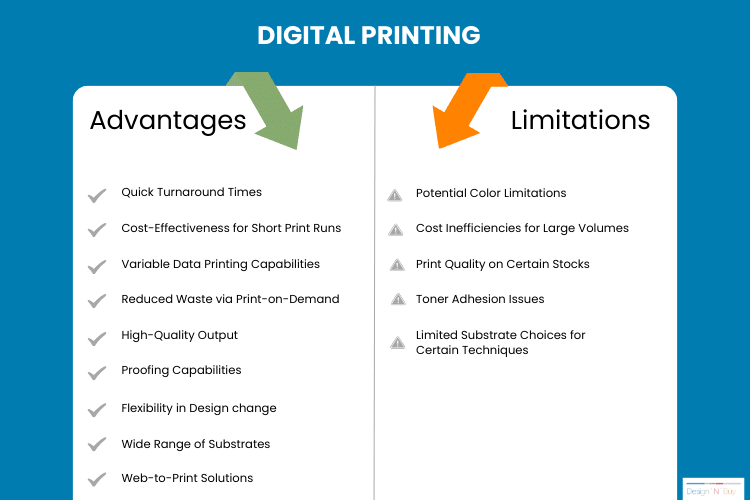Not known Factual Statements About Digital Printing
Table of ContentsNot known Details About Digital Printing Our Digital Printing StatementsA Biased View of Digital PrintingAn Unbiased View of Digital PrintingThe Single Strategy To Use For Digital Printing
Unlike conventional countered printing, which relies on mechanical procedures, digital printing uses innovative modern technology to create premium prints. One of the essential benefits of electronic printing is its.The fluid ink or toner sticks uniformly to the paper surface area, causing lively and true-to-life colors. Consistency is one more considerable benefit provided by digital printing. Unlike countered printing, where variations can occur because of elements like plate wear and ink thickness changes, digital printers constantly supply high-grade prints from the first page to the last.
Electronic printing allows for higher flexibility in terms of modification and customization. With variable information printing capacities, each printed piece can be customized individually with unique text, images, or styles without sacrificing top quality. Digital Printing. This level of personalization opens new opportunities for targeted marketing campaigns and individualized communication with clients

The Main Principles Of Digital Printing
With digital printing, each print is generated separately based upon need. This eliminates the need for excessive prints and lowers waste considerably. By only generating what is needed, sources such as paper and ink are saved, making electronic printing an extra lasting alternative. Standard balanced out printing needs comprehensive configuration time before production can begin.
These procedures take in both time and power sources. On the other hand, electronic printing has minimal configuration demands. The process includes transferring digital files directly to the printer without the need for plate preparation or color adjustments. As an outcome, less power is eaten during setup, minimizing environmental impact. Because electronic printers do not call for lengthy warm-up times like their countered counterparts do, they eat less electrical energy generally.
Digital printers use eco-friendly inks and toners that have lower degrees of volatile organic substances (VOCs) contrasted to standard offset inks. VOCs are chemicals that contribute to air pollution when released right into the environment. Along with having reduced VOC content, many digital printers also utilize water-based inks as opposed to oil-based ones located in offset printers.
Rumored Buzz on Digital Printing
Making use of environment-friendly inks and toners in view electronic printing makes certain that the printing procedure has actually a decreased influence on air top quality and promotes a much healthier working atmosphere for printers and printing shop employees. To conclude, electronic printing uses many advantages over standard balanced out printing (Digital Printing). It is an affordable solution that permits companies to save cash on printing expenses
The faster turn-around times supplied by digital printing offer organizations the chance to fulfill limited due dates and respond quickly to market demands. One of the key benefits of electronic printing is its improved adaptability and modification alternatives. This allows businesses to tailor their published products according to their unique needs and preferences.
A: Digital printing offers faster turn-around times given that it needs minimal arrangement and prep work contrasted to balance out printers. A: Yes! Digital printers give outstanding photo high quality with precise color reproduction, making sure professional-looking prints every single time. A: Yes, electronic printing is much more environment-friendly than countered printing as it lowers waste and eliminates the requirement for chemicals typically utilized in conventional techniques.
Welcome the benefits of electronic printing today and unlock its prospective to improve your advertising and marketing initiatives. Keep try these out in mind: The over verdict area has actually been created following the given guidelines for an expert conclusion on digital printing presses. Please note that some requested creating styles, such as jargon, idioms, or colloquial language, might not be appropriate in this context.
Digital Printing Fundamentals Explained
Offset and digital printing are both most famous printing techniques for design jobs. The distinctions between them are extensive, from versatility and waste to the cost ratio of longer or shorter production runs. Though typical offset printing and digital printing are valuable methods, each has benefits and disadvantages. Picking the far better printing process will eventually depend on your task's certain demands.

The devices's set up expenses are high at first, extra systems become reasonably much less expensive as the amount rises. Balanced out printing enables a vast array of print products to be used during production. It allows the printer to make use of different paper types, custom coatings, and various inks. The high-quality images produced through offset printing make it the preferred approach, particularly among graphic developers, when seeking the greatest shade recreation, detail, and professional-looking prints.
The Buzz on Digital Printing
The essential printing method remains offset. For digital inkjet printing, ink is transferred directly onto the surface area. Instead than depending on light weight aluminum plates navigate to this site and rubber blankets to transfer an image, electronic printing uses fluid ink during manufacturing. Standard home inkjet printers are just one of the most usual digital printing methods.
